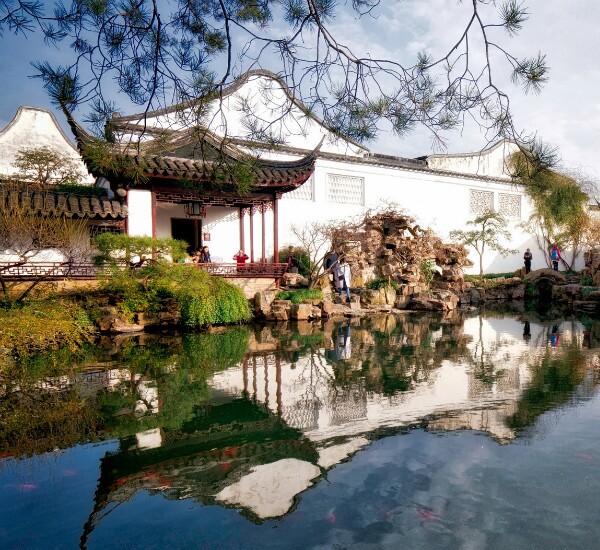Zhenjiang is a prefecture-level city of Jiangsu province, People's Republic of China. The city was once the provincial capital of Jiangsu province during the rule of the Republic of China. With a rich heritage of culture and art, the city is often associated with many of the fascinating folk mythologies in Chinese history. In 1986, the city became one of the well-known historic and cultural cities in China.
The city is situated on the crossway of the third longest river in the world---the Yangtze River---and the longest man-made canal in the world---the Grand Canal. Zhenjiang borders Nanjing on the west, about 70 km (1 hour by car). The prefecture-level city of Zhenjiang administers six county-level divisions, including three districts (Dantu District, Jingkou District and Runzhou District) and three county-level cities (Danyang City, Jurong City and Yangzhong City). Zhenjiang has a total population of three million and has a land area of 3,847 square km.
The most famous tourist sites in Zhenjiang are "the three hills", namely Gold Hill, Jiao Mountain and Beigu Hill, all standing by the Yangtze River. With heights of less than one hundred meters, all of the three hills overlook the Yangtze River with precipitous and steep cliffs. Developed since early times, an abundance of antiques and temples remain on the hills, and legends and myths circulate about them. Among the hills, Gold Hill is in the west part of the old downtown, with a height of 44 meters. Tianchan Temple conforms harmoniously to the hill forming a unique scene, described by the classic saying "the temple wraps the gold hill". Beigu Hill standing in the river is famous for the century-old Dinghui Buddhist Temple. "Zhenjiang Three Hills" are known as key national scenic spots. Along with Three Hills, another famous scenic spot, Maoshan Mountain, has been listed as a National AAAA Tourist Spot.
Zhenjiang Weather
Like Suzhou, the average temperature in July is 27.7 °C and the coldest temperature in January is 2.7 °C. Urban average annual rainfall is 1088.2mm. While a “rainy season” appears every June and July, the urban area enjoys plentiful sunshine, with a mean sunshine duration of 2,009.9 hours.
The best time for travel in Zhenjiang is spring and autumn, during which times a variety of festivals are held. Every December 31st, New Year's bell striking and wish making take place at Jinshan Temple. In May and April, the cherry blossoms in the Zhenjiang Baotashan Park bloom and the Magnolia Flower Festival of Baohua Mountain is held, along with the grand temple fair in Jurong Maoshan Hill. During Mid-Autumn Festival, the Osmanthus Flower Festival in Jiaoshan Hill Park and Golden Autumn Gourmet Festival are held one after another.
History
With a history of over 2,500 years, Zhenjiang is a famous historical and cultural city and a top tourist destination. In the late Eastern Han Dynasty, the emperor Sun Quan moved the capital from Suzhou to Zhenjiang, and Zhenjiang was renamed Jingkou. Great people from many dynasties such as Li Bai, Bai Juyi, Su Shi, and Wen Tianxiang all composed a number of magnificent poems about the city. Such myths, legends and historical tales as "White Snake Flooded the Gold Hill"in Tale of the White Snake, "Emperor Liu Bei got married in Dinghui Buddhism Temple"in the Romance of the Three Kingdoms and "Liang Hongyu fights against Jin army " added to the magic and beauty of Zhenjiang.
Furthermore, Zhenjiang has a long history of religious culture. In ancient times there were eight famous monasteries, in which eminent monks were trained. The millennial ancient temple, Tianchan Temple, was the first temple to hold Shui Lu Dao Chang, and become a Buddhist holy site. The late abbot of Dinghui Temple, Ming Shan, holds very high religious status among monks in China. Baohua Mountain, known as "the First Mountain of Vinaya", was the most prominent place to learn Buddhism during the Ming and Qing dynasties. More than 70% of the monks in that period were ordained in this temple. Zhenjiang's Maoshan Taoist Temple was regarded as "the Eighth Sight"and "the First Holly Land"by Taoists. Every year thousands of Buddhist monks and nuns and pilgrims come to Baohua Mountain to get ordained. In addition, Chuishan Mountain Shaolong Temple, and Zhenjiang mosques demonstrate the region's strong religious culture.
Zhenjiang postal code: 212000
Telephone area code: 0511









